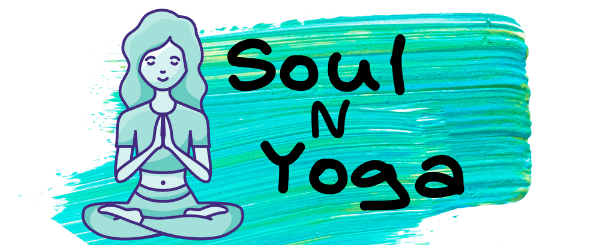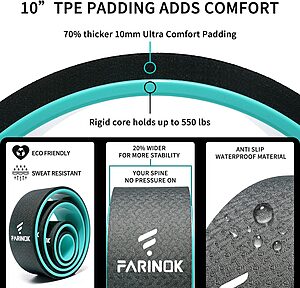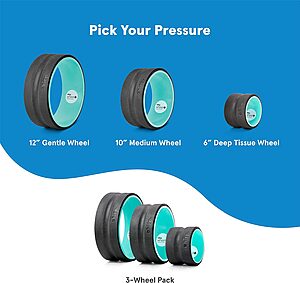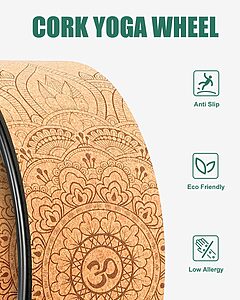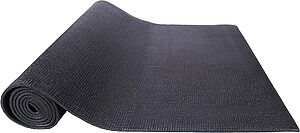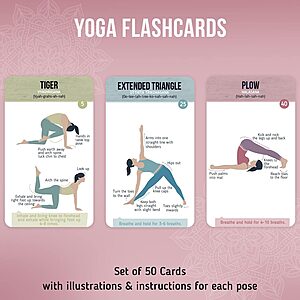Do you enjoy practicing yoga? Do you sometimes wonder why your muscles feel tight after yoga? If so, you’re not alone. Yoga is a popular exercise that can help improve flexibility, strength, and overall fitness.
But for some people, it can also cause some discomfort. We’ll explain why your muscles may feel tight after doing yoga and what you can do to prevent this from happening.
This article will go over the most common reasons why your neck or other muscles might feel tight after doing yoga.

Here’s The Answer to Why Do the Muscles in My Neck Feel Tight After Yoga
The postures in yoga that can cause soreness in your neck muscles are the ones that flex and extend the head.
The muscles in your neck feel tight after yoga because of the postures you’re doing.
For example, when you do a posture like Down Dog, it causes your neck muscles to flex and the small of your back to stretch, prompting your body to send blood flow to these areas.
Your body’s tissues are stretched when you do extended yoga postures, such as inversions like Sirsasana, Yoga mudra, and the like.
This can cause your muscles to feel tired and sore. It can also cause micro-tears in the muscle fibers, which leads to soreness.
Why Do The Muscles In My Neck Feel Tight After Yoga?

Neck pain and stiffness after yoga is a common complaint among yoga practitioners. While there are many possible causes, some of the most common include neck pain caused by tension and stress, poor posture, and muscle strain.
To help prevent neck pain and stiffness after yoga, stretch your neck regularly before and after class. Additionally, you can try using a neck rest to help relax those tense muscles.
As you practice yoga, the muscles in your neck can become tight. Several factors may be at blame: muscle spasms, arthritis, whiplash, or even a stiff neck.
If you feel pain in your neck after yoga practice, it’s important to take care of yourself and be sure you’re not damaging your body.
Your Posture
The reason for neck tightness could be your posture during yoga is not right. Most of the time, people slouch in the pose, and this causes tension in the neck muscles.
- To avoid this, try different poses until you find one comfortable for you and allows you to relax into the postures. If you have trouble keeping your neck upright, put your hands on your hips or the floor.
- And lastly, make sure to stay tall and elongate your spine throughout the pose. When you sit for extended periods, your shoulder blades can compress your neck and cause neck strain.
- This is especially true because of bad posture, which can cause your shoulders to slump forward and strain the muscles in your neck.
Sleeping in The Wrong Position
Neck muscles can get tense and swollen after practicing yoga, and sleeping in the wrong position can cause. To avoid this, place your head on a firm pillow to avoid neck pain and stiffness.
Your neck muscles can tense during the night if you sleep in the wrong position. Keep your arms and legs uncrossed at the knees and elbows, and avoid using too many pillows.
Sleeping in the wrong position can be a common cause of neck pain. This is because sleeping on your side can pressure the spinal cord and nerves, which are located in the neck.
This pressure can lead to persistent neck pain, stiffness and pain, and even nerve compression. A neck collar may help relieve these symptoms and prevent them from recurring.
Stress
Many people believe that yoga is a great way to de-stress and improve overall health. However, some people may experience neck pain and tension after practicing the ancient practice.
The reason for this is that when you do yoga. The muscles in your neck are put under a lot of stress. This can cause the muscles in your neck to feel tight and knotty after yoga class.
- Try to relax those muscles by practicing mindfulness or deep breathing exercises before class. Alternatively, wear a neck brace during class if you find your neck muscles tense frequently.
- Stress, tight muscles, and bad posture are possible causes of neck tightness after yoga. Neck tightness can be caused by repetitive movements, manipulation, or a long time in bad posture.
- If you have been experiencing neck tightness after yoga, it is important to ease up on the intensity of your poses and find ways to relax and decompress your body.
Asymmetrical Muscles in The Neck
Complaints about neck pain are extremely common. A variety of variables might contribute to this problem, but asymmetry in the neck muscles is the most typical culprit.
- If you have these muscles out of balance, it can cause tension and pain in your neck. Stretching and relaxing these muscles can be accomplished through the practice of yoga.
- In addition to stretching, make sure to practice regularly and see if the pain goes away. You should see your doctor if it doesn’t work within a few weeks of constant practice.
- Permanent damage to the back of the head, cervical vertebrae, or muscle strength can all lead to this condition. Asymmetrical muscles may also be caused by a weight imbalance between your head’s right and left sides.
This is more likely to develop if you spend excessive time sitting still, causing one side of your body to become more relaxed than the other side.
How Can you Relieve The Tension In Your Neck After Doing Yoga?
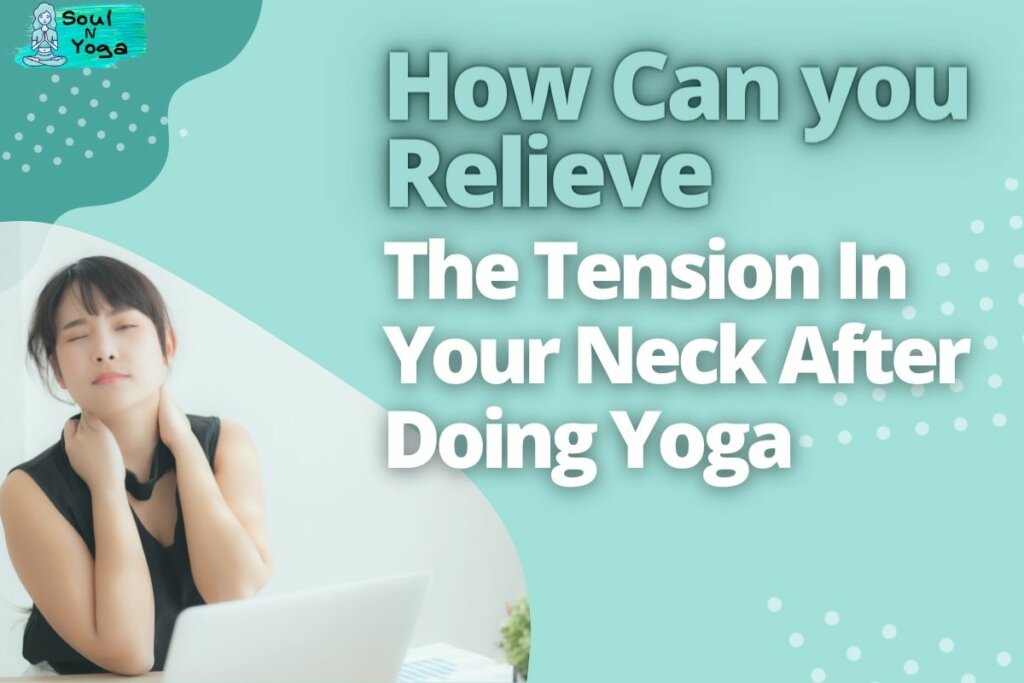
Yoga can help relieve this tension and tension headaches. Be sure to find an appropriate class for your level and take it slowly at first.
In addition, start with simpler poses and work your way up as you become more comfortable. Aside from the physical benefits, yoga is a terrific way to unwind after a long day.
Try it today! It may bring surprising relief.
Relaxing Your Muscles After Doing Yoga
Before and after your yoga practice, stretch all of your major muscles to help alleviate any tension in your neck and shoulders.
You can do this by using self-massage techniques or taking a hot bath. Make sure to massage your neck, shoulder, and upper back muscles for about 15 minutes after yoga.
This will help you relieve neck tension and pain and improve your posture.
Practice Proper Posture
To ease neck strain after practicing yoga, it’s vital to practice the correct posture and take regular rests.
Make sure you practice the correct poses and keep your body in the correct alignment. Water and a good diet can also assist in keeping your spine and neck nourished.
Yoga is an excellent way to improve your posture and overall health, so give it a try!
Stretches Before Yoga
The tension is due to the muscles in your neck and shoulders getting tight from all the stretching. Try these quick stretches before class to loosen up and feel better.
Do these stretches before each yoga class so that your muscles can get a good workout and tension can be relieved gradually. And remember, it takes time for yoga to work its magic – be patient!
Yoga Poses That Can Help To Relieve Neck Pain

The yoga poses that can help relieve neck pain are the Camel Pose, Boat Pose, Side Plank Pose, Corpse Pose, and Side of the Neck Stretch.
Camel Pose: This pose stretches your shoulders and neck by raising your head towards the ceiling.
Boat Pose: This pose is great for relieving tension in your upper back, shoulders, and neck.
Side Plank Pose: This pose is perfect for stretching out your entire side body from your hips to shoulders, which can help relieve tension in your neck muscles.
Corpse Pose: This pose helps to reduce stress on your spine while also stretching out your hamstrings and calves. It’s also great for calming anxiety and promoting restful sleep.
Side of the Neck Stretch: This stretch is easy to do anywhere because you don’t need any equipment or shoes! To perform it, place one hand on a wall with your elbow bent at 90°. Then, slightly bend your knees as you keep your feet flat on the ground (like sitting cross-legged).
When To See A Doctor About Your Neck Pain
Neck pain can be caused by various factors and requires an evaluation to determine the cause. If the discomfort from your neck pain continues or worsens, it’s important to seek medical help.
There are many different treatments available, so it’s important to consult your doctor about what will work best for you. Remember, neck pain is a common complaint, so don’t hesitate to seek help if the pain is becoming too much to handle.
- If you have neck pain that lasts longer than two months, it’s important to see a doctor. Neck pain can be caused by an injury or something like osteoarthritis or chronic pain.
- You should see a doctor if your neck pain lasts longer than two months. You likely have a medical condition and should see a doctor immediately.
How to Avoid Tension In Your Neck After Doing Yoga
Yoga is a terrific method to unwind and relax. However, after a session, the neck can become tight. To avoid tension, always take your time and breathe slowly and deeply during each pose.
Additionally, practice regularly, and you’ll see marked improvements in how you feel mentally and physically! When you’re finished, stretch your neck gently by touching your chin with your hand or fingers.
Avoid tension in your neck after doing yoga by taking frequent breaks, keeping your eyes level, using a heating pad, and practicing relaxation techniques. Also, make sure to maintain good posture throughout the practice.
How Can Physical Therapy Help With Neck Pain?
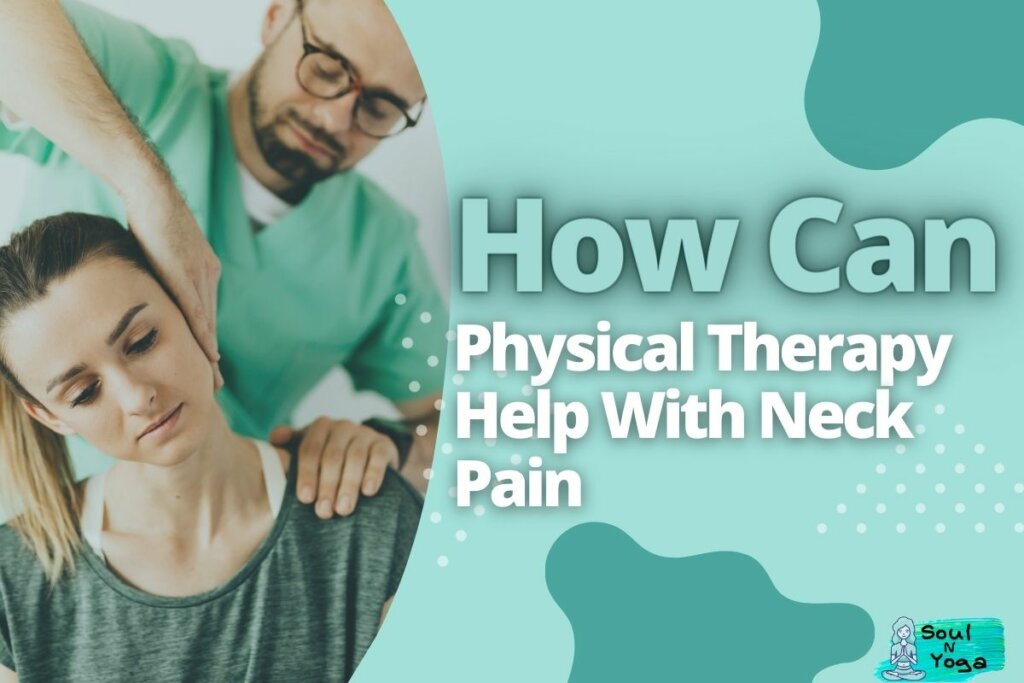
Stretching the muscles and restoring normal movement can help to relieve neck pain quickly. However, physical therapy isn’t a one-time fix – it’s a long-term solution that requires regular and careful follow-up.
If you suffer from chronic neck pain, physical therapy may be the best option. Physical therapy can help with neck pain by addressing the underlying issues, such as muscle strain or weight of your head.
A physical therapist will use exercises and stretches to strengthen the muscles in your neck, which will help with pain relief.
In addition, physical therapists may recommend acupuncture or massage therapy to help relieve pain and tension in the muscles surrounding your neck.
A Variety of Factors Can cause Neck Pain
Neck pain can be a common problem, especially among people who frequently work or strain their neck muscles. Numerous things might contribute to it, each with its advantages and disadvantages.
For example, physical therapy is often effective in reducing neck pain due to improper positioning of the head and neck. In addition, repetitive stress on the cervical spine (neck) can also lead to pain.
Treatment options for neck pain vary depending on the cause and severity thereof. However, physical therapy is often an effective way to reduce pain and improve function.
Cervical Spine Dysfunction
Physical therapy will help improve the range of motion and strength in the neck muscles, but it can also help restore normal function and decrease your pain levels.
Neck pain is usually caused by cervical spine dysfunction, which Physical Therapy can help restore. Let us know if you’re experiencing neck pain, and we’ll make an appointment for you right away!
Alternative Treatments For Neck Pain
If you’re suffering from neck pain, there are a variety of alternative treatments that you can try.
For example, reflexology, acupuncture, and chiropractic care are all safe and effective treatments that can help relieve pain and improve your overall wellbeing.
If one treatment is not working for you, explore other options until you find the one that works best. To summarize, don’t be hesitant to ask for help if you’re suffering from neck discomfort. It only takes some time and energy to find a solution that works for you.
Home Remedies For Neck Pain
Neck pain sometimes results from various causes such as poor posture, accident injuries, or tension headaches. Try massage, hot baths, acupuncture, and essential oils to get relief from neck pain.
Keep in mind that neck pain can be eased by avoiding strain and keeping your neck in a neutral position when working or using the computer.
A cool compress can also help reduce inflammation and pain. In addition to these traditional treatments, you can try many natural remedies such as chiropractic care and homoeopathy.
If you are looking for an affordable and effective solution for your neck pain, give one of these remedies a try!
Massage
If you’re suffering from neck pain, massage is a great way to relieve the tension and pain. You can get massages by a professional massage therapist or at home using simple techniques like yoga or stretching.
Most people find that regular massage reduces their symptoms of neck pain significantly. Neck pain is often caused by repetitive strain or tension on the neck muscles and ligaments, and massage can help to release this tension.
If you’re having trouble finding relief from traditional treatments, consider trying massage as an alternate treatment.
Acupressure
If you’re looking for an affordable and pain-free treatment for neck pain, you should try Acupressure. TCM’s Acupressure uses pressure and finger strokes to alleviate neck and shoulder pain. But, again, it’s a TCM technique.
You can use it to help relieve pain from tension headaches, cervical spine problems, and more. Inexperienced practitioners should begin by working their neck muscles before expanding to other body parts.
Acupressure is a great way to ease pain and improve your quality of life.
Conclusion
After reading this blog, you will know the answer to the question Why Do The Muscles In My Neck Feel Tight After Yoga?
As well as the different ways to relieve neck pain, when to see a doctor and alternative treatments. Keep practicing yoga and avoid neck pain by following the advice provided in this blog.
It would help if you did neck massages. Neck massages are great if you want to relieve tight muscles in your neck. Neck massages are a simple way of relieving your neck muscles, and they are also a great way of relaxing your muscles.
This is how to avoid having stiff neck muscles. I hope it helps.
Frequently Asked Questions
Do yoga cause tight muscles in the neck?
Yoga can cause tight muscles in the neck when it’s practiced with poor posture. Likewise, sitting in a bad position or staring at a phone, computer, or another gadget for long periods can cause tight, aching neck muscles.
Can I do exercises which help my neck at home or should I go to a gym?
Neck exercises can be done at home, but neck pain may worsen without a physical therapist or doctor. Exercise can help reduce neck pain, but physical therapy and neck surgery may be necessary for more severe neck pain. A gym may provide neck training that is tailored to your individual needs. However, before beginning any fitness regimen, you should always speak with your doctor.
What is the best way to loosen up the muscles in my neck?
The best way to loosen up the muscles in your neck is by practicing gentle neck stretches. Sitting or lying down, you can practice these exercises. Another way to loosen up the muscles in your neck is by giving them a good massage. A few simple neck stretches will also help loosen your neck muscles.
What causes neck muscles to tighten?
Neck muscles tighten when the neck is compressed in an unnatural position. This can be caused by poor posture, scarf neckwear, a tilting head forward posture at work or during the day, and a cervical spine alignment issue.
